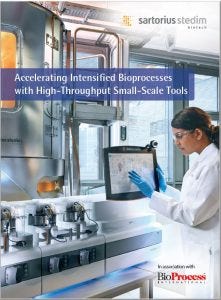Voices of Biotech
Podcast: MilliporeSigma says education vital to creating unbreakable chain for sustainability
MilliporeSigma discusses the importance of people, education, and the benefits of embracing discomfort to bolster sustainability efforts.
June 26, 2018
Sponsored by Sartorius

On the cover: State-of-the-art upstream processing with SSB‘s bioreactors ambr250 modular and Biostat STR
While many biopharmaceutical companies are exploring paths toward continuous processing, many tools already exist for implementing process intensification. As the authors of this special report illustrate, hybrid continuous processes that benefit from single-use technologies along with
continuing improvements in perfusion cell culture already now are enabling improvements in cost reduction and accelerating time to market. And novel high-throughput and automated small-scale systems are helping development scientists gather more information in less time than before, reduce their development footprints, and make more efficient use of capital equipment.
These novel tools enable critical decisions to be made early in development regarding a product candidate’s manufacturability. The authors of this
report describe ways in which process development engineers are learning much more about the specific behavior and characteristics of their biological products and processes under specific conditions at the earliest stages of development. Recognizing process challenges – and the ability to optimize processes efficiently – will allow development scientists and engineers to assess the big picture of their processes and further drive the success of the biopharmaceutical industry.
Implementing Process Intensification in Commercial Manufacturing
Miriam Monge, Gerben Zijlstra, and Nick Hutchinson
Perfusion in Automated Single-Use Minibioreactors
Gerben Zijlstra, Melisa Carpio, and Nick Hutchinson
Assessing Manufacturability During Candidate Selection
Marc Jenke and Nick Hutchinson
Just fill out the form to view and download the complete eBook.
You May Also Like